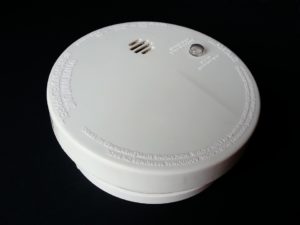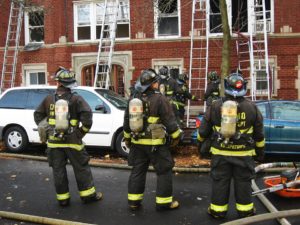Smoke Detectors in Apartments
 Let’s talk about the law on smoke detectors in apartments and rental homes in Tennessee. What should a landlord do? What about a tenant? Do you have a case? Below are questions some of you might have:
Let’s talk about the law on smoke detectors in apartments and rental homes in Tennessee. What should a landlord do? What about a tenant? Do you have a case? Below are questions some of you might have:
Q: I own and lease a rental house in in Memphis, Tennessee. Am I required to provide smoke detectors for the tenants who live in the house?
Q: I rent a house in Germantown, Tennessee, and there was a fire at night. There were no smoke detectors in the house, and by the time I woke up and called 911 the fire had spread so far that the firemen weren’t able to save anything. What are my legal rights?
Law on Smoke Detectors in Tennessee
Under Tennessee law, a landlord must install and maintain smoke detectors in any residential unit offered for lease or rent. Specifically, Tennessee Code Annotated 68-102-151 provides that it is:
unlawful to…[o]wn or operate a one-family or two-family rental unit without installing an approved smoke detector in each living unit; when activated, the detector shall initiate an alarm that is audible in the sleeping rooms of the living unit….
Law on Smoke Detectors in Memphis
The Memphis City Code of Ordinances Sec. 14-4-88 further provides that
A. No person shall occupy as owner-occupant, or shall let another for occupancy, any dwelling, multifamily dwelling, dwelling unit, rooming house unit, lodging house or lodging unit which does not comply with the applicable provisions of the fire prevention code or the building code and other ordinances of the city and the additional requirements set out in this article for safety from fire.
B. Smoke detectors shall be installed in all residential properties in accordance with National Fire Protection Association Standard No. 74, 1989 Edition, and shall be maintained in an operable condition.
Memphis City Code of Ordinances Sec. 9-44-6 also states that:
. . . Smoke detectors are required…[i]n every existing dwelling unit within an apartment house, condominium complex, dormitory, townhouse or duplex….; and [e]very existing guest room in a motel and hotel. . .
*Other municipalities may have similar local ordinances. The Memphis ordinances referenced here are merely offered as an example of additional law that may or may not apply to a particular situation.

What happens if a landlord does NOT provide smoke detectors?
First — a quick distinction. There may be legal claims arising out of how the fire originated. For example, there may be an underlying claim against a manufacturer for a defective product (i.e. appliance) that caught fire, or against a contractor for improper construction or wiring, or against the landlord or management company for negligent maintenance of the house itself.
By comparison, a claim for lack of a working smoke detector would be a claim independent of other claims. It could potentially constitute an additional claim on top of a fire-origination claim, or it could constitute a stand-alone claim — for example, where the underlying fire was not necessarily due to the fault of any third-party, but where the lack of a smoke detector led to enhanced damages or injuries.
Do I have a case against my landlord?
Under the law, a failure to follow a statutory requirement would likely constitute negligence per se. Of course, a finding of negligence would not in and of itself result in liability for damages. There would also need to be proof that the lack of a smoke detector actually resulted in a delay in the detection of the fire, and which caused damages attributable to that delay, and not just due to the underlying fire itself.
Example: Our firm filed a $10 million lawsuit arising out of the wrongful death of a 2 year old little girl in a house fire. The fire allegedly occurred because a child innocently knocked over a space heater. The lack of a smoke detector, however, allowed the fire to spread for several minutes and ultimately rage out of control before an adult in the back of the house discovered the blaze. Unfortunately, it was too late for the little girl. Had there been a smoke detector, that little girl would be alive today. So, the lawsuit claim in that instance is not about the origination of the fire, or for recovering damage that would have occurred from a “regular” fire. The lawsuit claim is only about the enhanced damage and loss of life that occurred only as a result of the lack of a smoke detector.
Tips for Landlords
INSTALL. Make sure that smoke detectors are installed in EVERY single rental unit you lease out. Ideally, you should have smoke detectors that are hard-wired into the electrical system of the rental unit, and that use batteries simply for backup. Landlords arguably also have the duty to maintain smoke detectors, so hard-wired detectors reduce the need for constant landlord inspection and replacement of batteries.
TEST. If you do not have hard-wired smoke detectors, periodically inspect and push the “test button” on the detectors, and also replace batteries as needed.
LEASE PROVISION. Include a provision in your Lease (and require your tenant to specifically initial it) stating and acknowledging that there are working smoke detectors in the rental unit at the time of move-in, that the tenant has personally had the opportunity to inspect and test the smoke detectors, and that the tenant acknowledges and agrees that her or she is responsible for replacing the batteries and periodically testing the smoke detectors.
Tips for Tenants
Never, ever live in a dwelling unit that does not have working smoke detectors, even if you have a difficult landlord and unfairly end up having to purchase and maintain the smoke detectors yourself. The danger to life and property is simply too great. Indeed, I can tell you from experience in dealing with clients — a great lawsuit is little comfort for the loss occasioned by a devastating fire. No amount of money can replace the irreplaceable.
Need a lawyer in Memphis on a Smoke Detector Case?
We’d be honored to help you. Call us at 901-372-5003 or email us here. We represent clients in Bartlett, Cordova, Germantown, Lakeland, Millington, Atoka, Memphis, Nashville, and the surrounding areas.
Patterson Bray. Small Firm. Better Focus. Big Results. To meet our team, click here. To learn what we do, click here.
If you like this Blog post, please share it on Social Media and follow Patterson Bray on Twitter and Facebook!




 Let’s talk about the law on smoke detectors in apartments and rental homes in Tennessee. What should a landlord do? What about a tenant? Do you have a case? Below are questions some of you might have:
Let’s talk about the law on smoke detectors in apartments and rental homes in Tennessee. What should a landlord do? What about a tenant? Do you have a case? Below are questions some of you might have:
 Have you ever heard of a public adjuster? Most people have not. When you file a claim with your homeowner’s insurance carrier, the company assigns an employee–called an “adjuster”– to investigate and handle the claim. The adjuster’s duties might include, among other things, to visit the damage site, to take photos, to hire and analyze data from cause and origin investigators, to parse what part of your damage is covered vs. what is not covered, and to coordinate with damage estimators and/or potential contractors.
Have you ever heard of a public adjuster? Most people have not. When you file a claim with your homeowner’s insurance carrier, the company assigns an employee–called an “adjuster”– to investigate and handle the claim. The adjuster’s duties might include, among other things, to visit the damage site, to take photos, to hire and analyze data from cause and origin investigators, to parse what part of your damage is covered vs. what is not covered, and to coordinate with damage estimators and/or potential contractors.